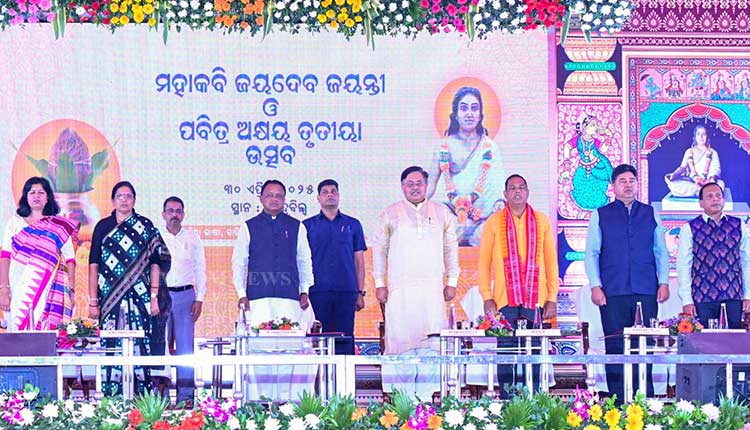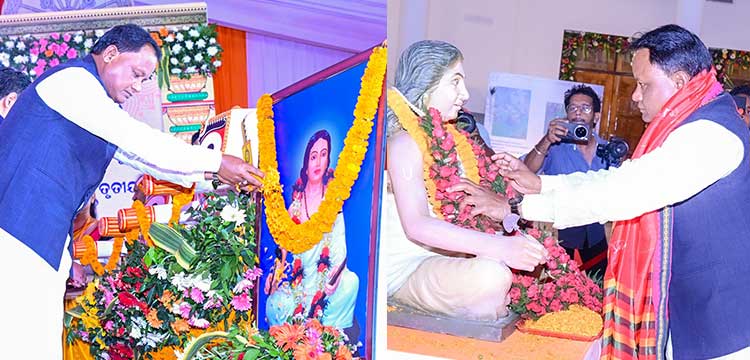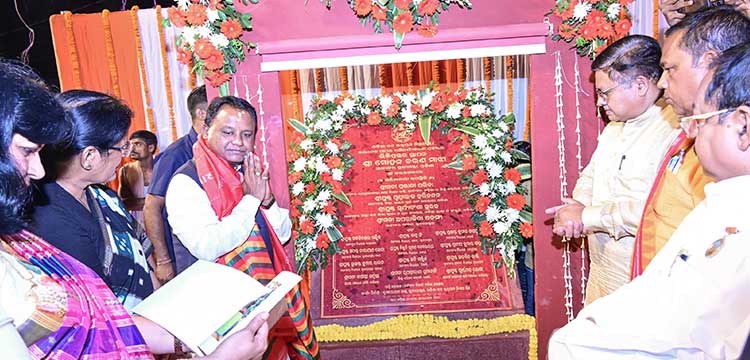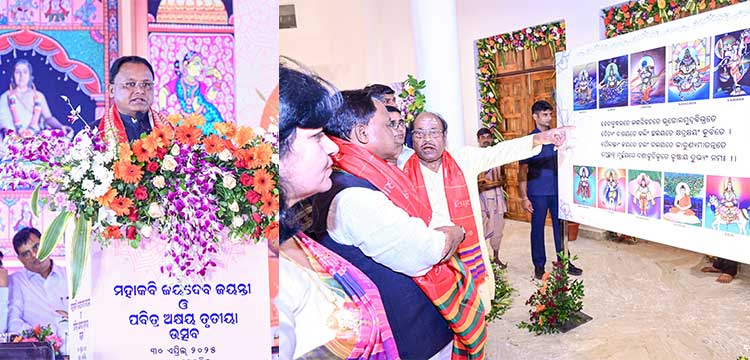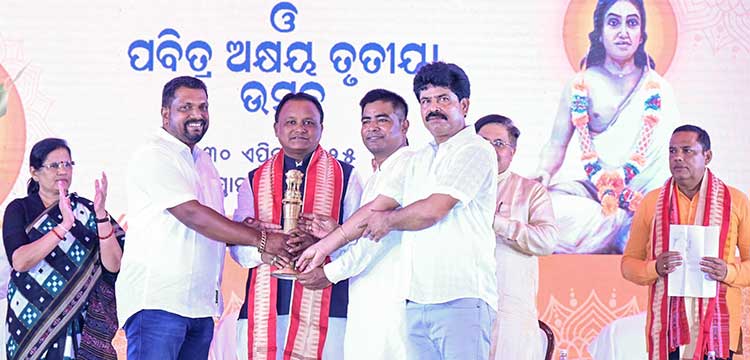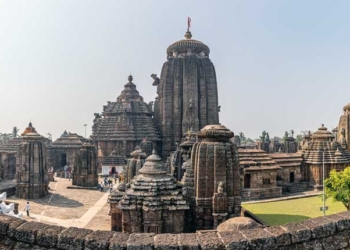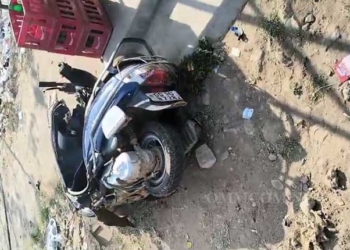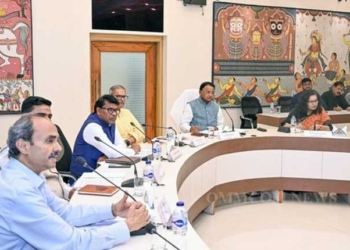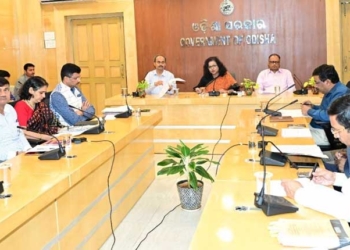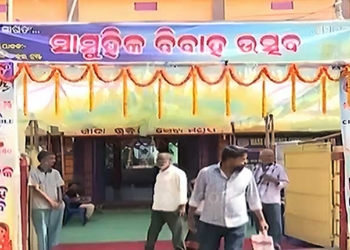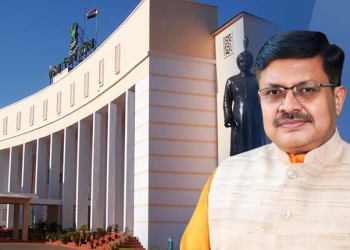Bhubaneswar: Poet Jayadev and his masterpiece Gita Govinda are integral to Odisha’s cultural identity, declared Chief Minister Mohan Charan Majhi during a program organized at Jayadev’s birthplace, Kendubilwa, on the occasion of Jayadev Jayanti. He described Jayadev as one of the greatest icons of Odia pride.
During the event, the Chief Minister announced several projects to transform the Jayadev Peeth into a global center for literature, culture, and spirituality, laying the foundation stone for some initiatives. He emphasized the goal of elevating the Peeth to a world-class spiritual hub.
A Rs 7 crore project was launched to develop the Peeth, including the creation of diverse flower gardens, ten lotus ponds, and a garden of creepers to restore the natural beauty of Jayadev’s era as much as possible. Additional projects announced include an entrance gate, a Dashavatara Plaza, beautification of the Padma Pond, development of various groves, a craft shop, and a food court. The Chief Minister assured that the state government would provide all necessary funds for these beautification efforts, noting the historical significance of the Peeth, believed to have been visited by Lord Jagannath himself.
To ensure comprehensive development, Majhi directed the Culture, Tourism, and Information & Public Relations departments to jointly prepare a detailed project report. He also advised Bhubaneswar MP Aparajita Sarangi, who was present, to spearhead efforts to transform the Peeth into a model village.
Majhi reiterated the government’s commitment to honoring Odisha’s great personalities, with this grand event at Jayadev’s birthplace being a step in that direction. Offering heartfelt tributes, he described visiting Kendubilwa on the sacred occasion of Akshaya Trutiya and Jayadev Jayanti as a matter of great joy, pride, and privilege.
The Chief Minister highlighted Jayadev’s stature not only for Gita Govinda but also as a peer among India’s greatest Sanskrit poets, including Ashvaghosha, Bhasa, Kalidasa, Bhartruhari, Bilhana, and Sriharsha. He compared Gita Govinda to Kalidasa’s Meghaduta for its literary excellence. Majhi noted that, long before Odia literary works like Sarala Das’s Mahabharata, Jagannath Das’s Bhagavata, and Balaram Das’s Dandi Ramayana, Jayadev’s Gita Govinda in Sanskrit became a timeless, nationally revered masterpiece, symbolizing Odisha’s spiritual identity.
Archaeological findings from the 8th to 13th centuries indicate that Kendulii village was a major center of Vaishnava culture, with Madhava idols suggesting the prevalence of Madhava worship. Local lore holds that the Madhava temple in Niali was Jayadev’s place of worship.
Majhi shared anecdotes and folklore about Jayadev’s life, emphasizing that Gita Govinda is dedicated to Lord Jagannath and Lord Krishna. He described Jagannath as a deity who loves devotion, music, and emotional expression, which is why Gita Govinda is performed as a ritual in the Jagannath Temple. The work, a poetic blend of love, devotion, and aesthetics centered on Radha and Krishna’s eternal divine play, has enriched India’s cultural and religious heritage.
Jayadev’s work has gained international acclaim, with Gita Govinda translated into languages such as French, German, Korean, Japanese, and English, captivating global scholars and literature enthusiasts. Its devotional, emotional, and musical qualities have made it widely performed and cherished.
In Odia literature, Gita Govinda has had a profound influence. The first Odia translation was done by Dharanidhar Das, followed by translations by Uddhava Das, Basudev Mishra, Jagannath Mishra, Ananta Rath, and Banibhushan. Works like Brundaban Das’s Rasabaridhi, Dinakrushna Das’s Amrutasagara, Bajari Das’s Arthagovinda, Pindika Srichandan’s Basantrasa, and Shyamasundar Bhanja’s Basanta Krida Samujjwala Rasabati were inspired by Gita Govinda.
Beyond Gita Govinda, Jayadev’s Dashavatara Stotra is globally revered. He was also proficient in Vedic studies and astrology, Majhi noted.
The event was attended by Deputy Chief Minister and Tourism, Women & Child Development Minister Pravati Parida, Law and Works Minister Prithviraj Harichandan, Bhubaneswar MP Aparajita Sarangi, Ekamra-Bhubaneswar MLA Babu Singh, Principal Secretary of Information & Public Relations Sanjay Kumar Singh, and Commissioner-cum-Secretary of Tourism Balwant Singh.
Principal Secretary of Odia Language, Literature & Culture Sanjeev Kumar Mishra delivered the welcome address, and Director Bijay Ketan Upadhyaya offered the vote of thanks.




